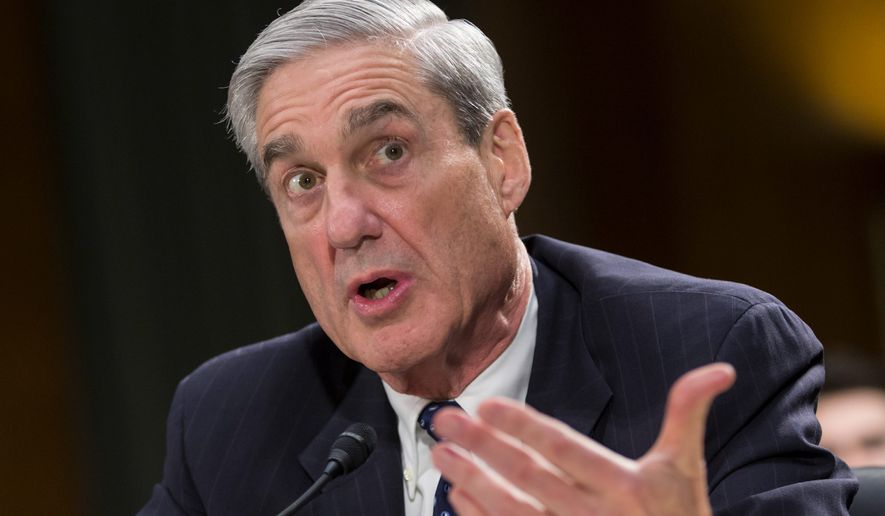Special counsel Robert Mueller may not have found a Russia-Trump conspiracy, but he did find plenty of other potential crime during his sprawling 22-month investigation, farming out 14 cases to other prosecutors to pursue.
Mr. Mueller’s 448-page report on his investigation, released publicly Thursday, gave only tantalizing references about the contents of most of those cases, with the juicy details largely redacted.
Two of the cases are already publicly known.
President Trump’s former personal lawyer and fixer, Michael Cohen, pleaded guilty to a host of crimes in the Southern District of New York and will begin a three-year prison sentence next month.
And Greg Craig, who once served as President Obama’s White House counsel, was charged with violating foreign lobbying laws in Washington. Mr. Craig has pleaded not guilty and is expected to have a trial in August.
But 12 other cases remain shrouded in mystery.
Their names are fully redacted in the report, citing “harm to ongoing matters.” It is possible the public may never learn who else got ensnared in Mr. Mueller’s probe. Justice Department policy forbids disclosing investigation targets until charges are publicly lodged.
Kendall Coffey, a former U.S. attorney for the Southern District of Florida, called the number of criminal referrals “extraordinary.”
Mr. Mueller said he referred the cases to prosecutors in local U.S. attorneys’ offices because they fell outside the scope of his mandate to uncover evidence of Russian meddling in the 2016 election and learn if members of the Trump campaign were involved.
Experts said the referrals made sense.
Keeping a major investigation on track has been a challenge ever since former independent counsel Kenneth W. Starr expanded the scope of his probe of President Clinton’s Whitewater land deal into a perjury probe.
“There is a reluctance not to travel too far down the road,” said Robert Ray, who succeeded Mr. Starr in that investigation. “The further down the road you travel, the more you become perceived as the president’s prosecutor rather than a person who is in charge of an investigation with a limited mandate.”
Mr. Ray said since the possible crimes were beyond Mr. Mueller’s investigative scope, he faced two choices: He could ask the Justice Department to broaden the purview of his probe or he could farm the cases out.
Mr. Mueller already had battled some defendants in court over the scope of his probe.
Paul Manafort, who was once Mr. Trump’s campaign chairman, said Mr. Mueller did not have the authority to lodge financial fraud charges against him. A federal judge denied Manafort’s request, ruling the charges fell clearly within the special counsel’s purview.
John Moscow, a former federal prosecutor who is now in private practice, said the referrals make sense.
“A regular DA or prosecutor can prosecute anything he finds in jurisdiction, but a special counsel may find a nice homicide they couldn’t prosecute because they are looking at collusion,” he said.
Mr. Moscow added that until the special counsel starts an investigation, it would be hard to know if it falls within his scope.
Mr. Coffey said he expects the cases will move to the top of local prosecutors’ to-do lists.
“Because these are referrals from a highly seasoned and talented team of prosecutors and investigators, they will not be ignored by others and, at a minimum, will likely result in significant follow-up investigative processes,” he said.
Andrew Leipold, a law professor at the University of Illinois who served as a consultant to the Starr team, said there could be reasons other than scope for Mr. Mueller to farm out cases.
He said conspiracy cases in particular could take awhile, and Mr. Mueller may have decided he didn’t want to hold up the main findings of his probe.
“No one thought these cases were germane enough to the central investigation to keep it going,” he said. “The time it takes makes me wonder if they are peripheral.”
• Jeff Mordock can be reached at jmordock@washingtontimes.com.




Please read our comment policy before commenting.